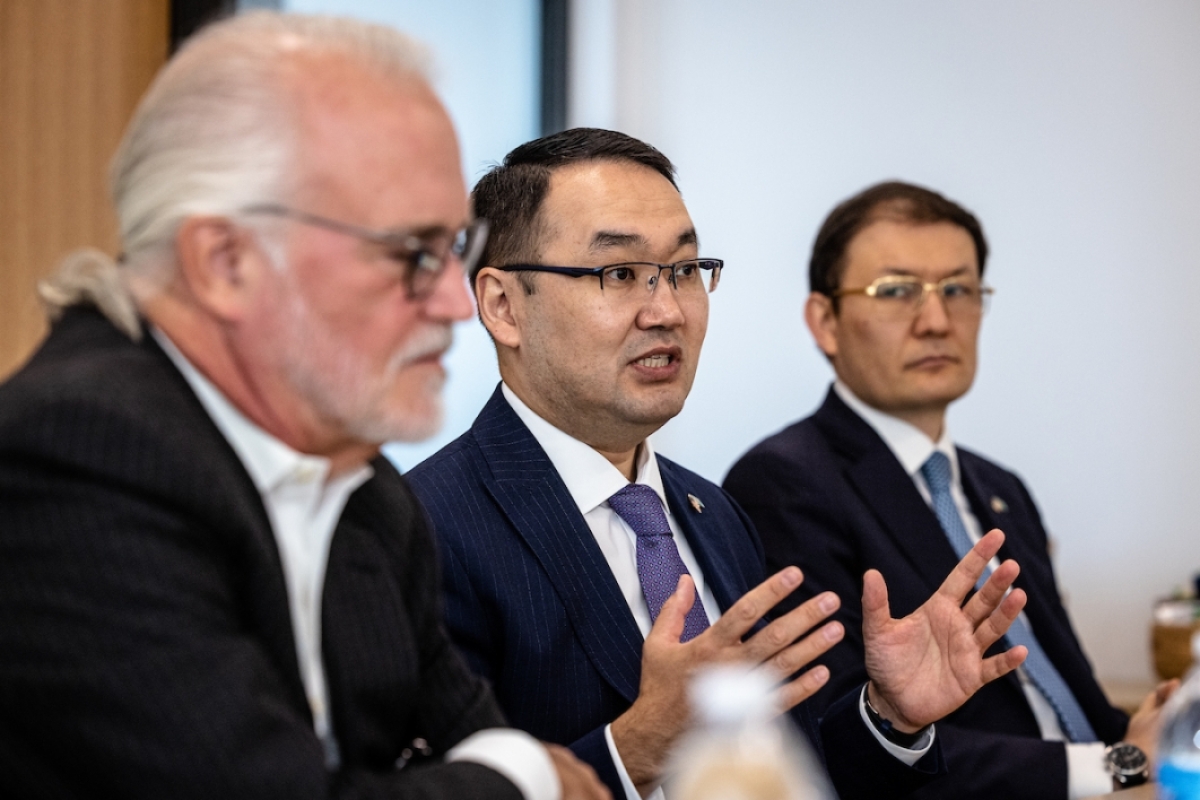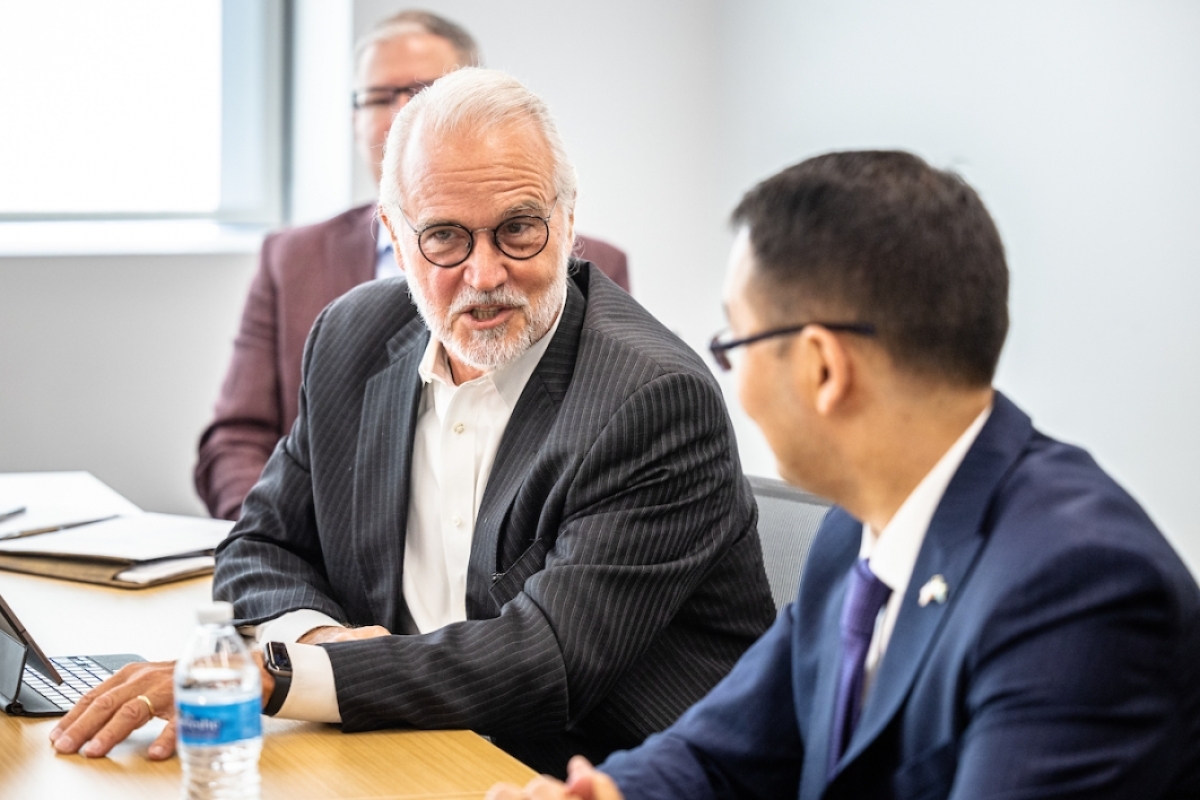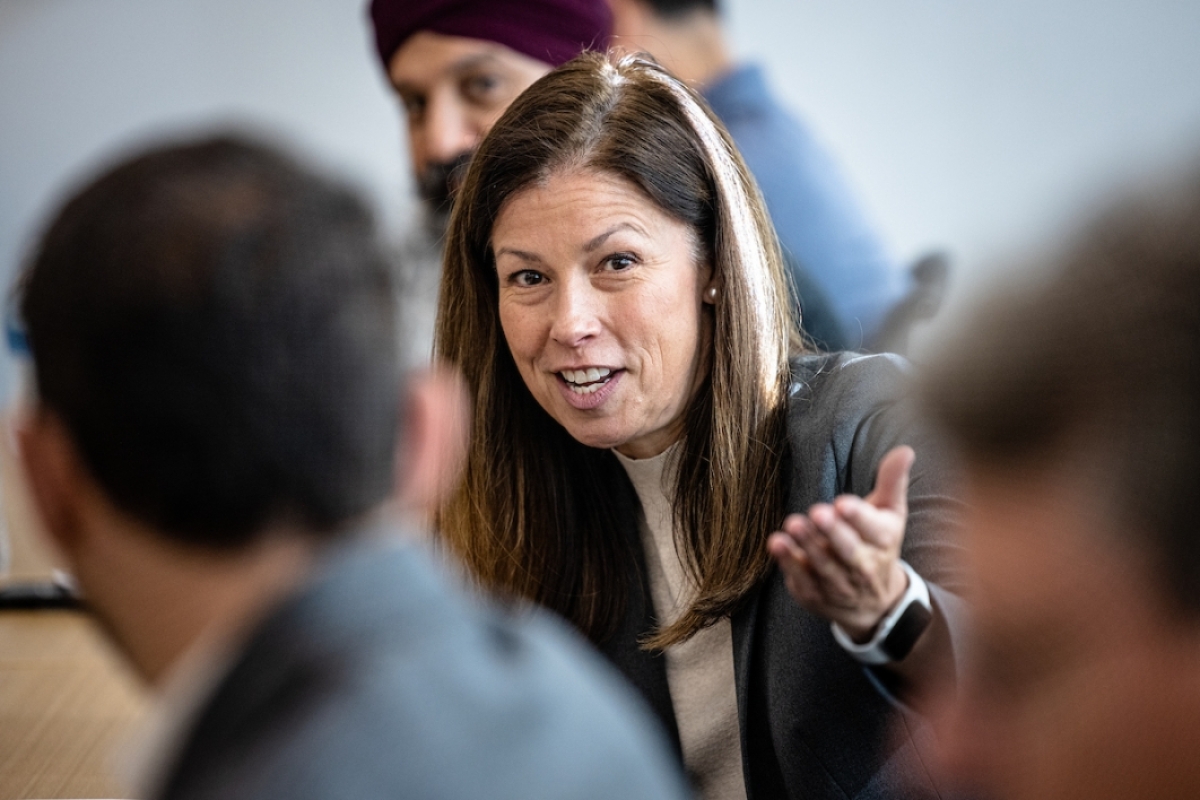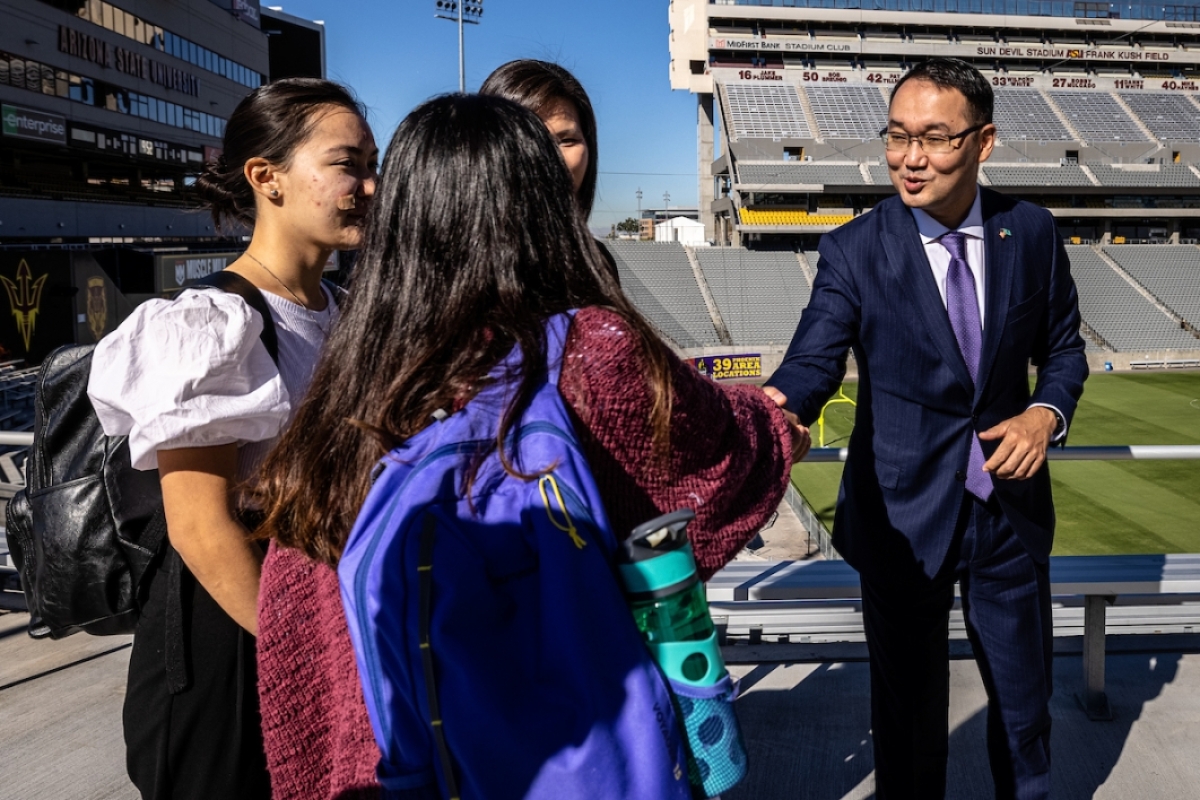Ambassador visit signals opportunity for ASU collaboration with Kazakhstan
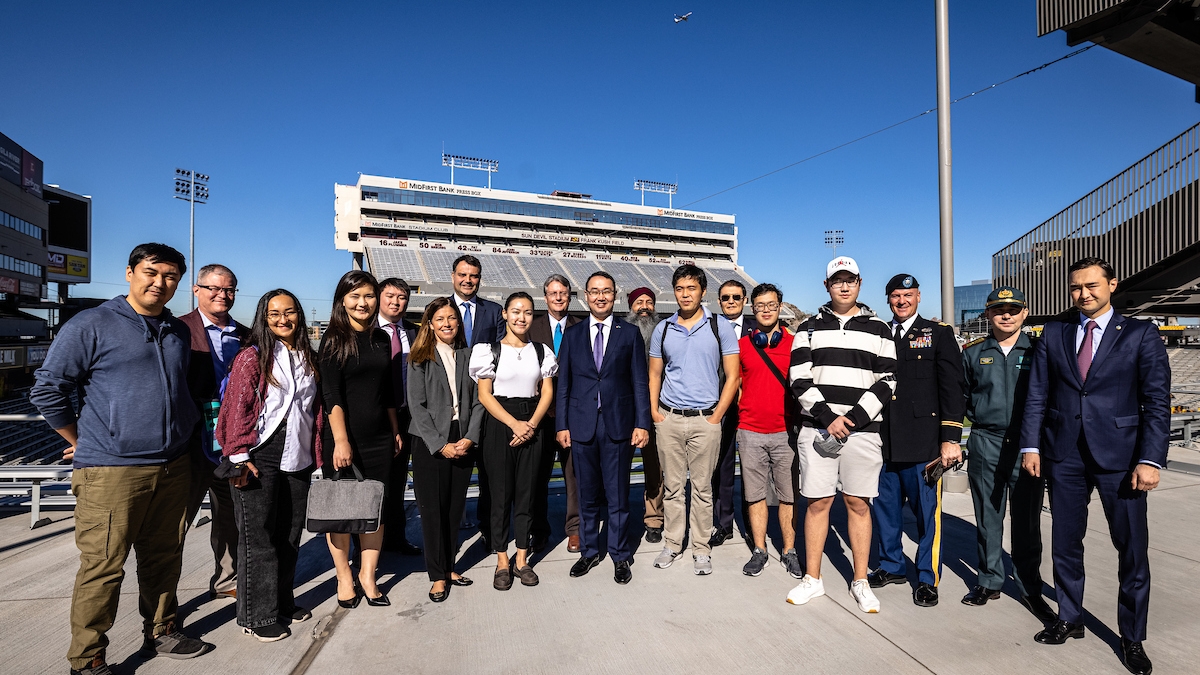
The Republic of Kazakhstan’s ambassador to the U.S. traveled to Arizona where he met with university, local and state representatives Oct. 27 inside the Pat Tillman Veterans Center suite at Sun Devil Stadium to discuss future partnership opportunities.
Ambassador Yerzhan Ashikbayev said Kazakhstan is the 9th largest land mass country in the world and biggest landlocked developing nation driven by a vision and ambition since declaring independence from the Soviet Union 30 years ago.
As a former nuclear power with past capability to produce biological and chemical weapons, Kazakhstan values political stability and maintaining a positive balance with its neighbors, including China and Russia.
“We inherited an arsenal bigger than the combined arsenals of the U.K., France and China,” said Ashikbayev, a 2012 Harvard graduate. “We made a wise decision to get rid of the nukes. In return, we were open for international cooperation.”
Kazakhstan’s link to Arizona is the Department of Defense State Partnership Program, which stems back to the first years of the newly independent country.
“The backbone of Kazakhstan-Arizona cooperation is the Arizona National Guard,” Ashikbayev said. “This is a tremendous success story. We’ll be celebrating the 28th anniversary of our partnership with the Arizona National Guard.”
Arizonans have been present in Kazakhstan every year since the start of the partnership, said Lt. Col. Pete Caffrey, Arizona National Guard State Partnership Program coordinator.
“The bottom line for us is that we are looking for partners and to find ways to synergize current and existing efforts, and maybe put a spark into someone that is looking for that connection with a counterpart in Kazakhstan … and we stand by to support,” Caffrey said.
The ambassador said he has witnessed the transformation of Kazakhstan defense forces as a result of the partnership with the state, and he now looks forward to expanding beyond defense.
“I am so happy there is a new avenue for cooperation,” Ashikbayev said. “And it’s education.”
The ambassador praised ASU’s work with Kazakhstan through the Melikian Center. The center “advances research, teaching and outreach on the languages, societies and geopolitics of greater Eurasia.” The center’s language training offerings include Kazakh.
He also commended ASU for its broad vision and interest beyond the Americas.
“This has become a time when the world is very connected,” said Craig Calhoun, Melikian Center interim director and former director and president of the London School of Economics and Political Science, who led the ASU delegation during the meeting on behalf of the university president. “While we are very interested, of course, in Latin America, our sense of what is important for the future of the world is not limited to proximity.
“We have technologies that transcend space, we have relationships at a very long distance.”
Emergency management is one area where ASU could assist Kazakhstan, a country susceptible to earthquakes and other natural disasters. The coordinated efforts of military, police, fire departments and other first responders to manage a catastrophic event are vital.
“We have a range of programs, from master’s degrees and applied and operational short courses in these areas,” Calhoun said. “This is important to us.”
Beyond degrees and courses, ASU’s Watts College of Public Service and Community Solutions is also home to the Center for Emergency Management and Homeland Security.
Many opportunities exist to build military-to-civilian and civilian-to-civilian cooperation, said Jeff Guimarin, Pat Tillman Veterans Center executive director. This largely depends on the ability to understand how to plan and be able to finance cooperation efforts.
“There are security cooperation funding lines that you can plan for and align objectives through the Department of Defense budgeting process,” Guimarin said. “What kind of resources can we go acquire? A university is a great place to go find those.”
Guimarin, a retired Air Force colonel, spent his last military assignment leading security cooperation and international partner development for the U.S. Cyber Command. There, he learned the intricacies of navigating the Department of Defense budget process to fund security cooperation programs. He sees a number of educational areas of cooperation of potential interest to Kazakhstan, including cybersecurity, sustainability and disaster preparedness.
“It’s a great win-win for the university to find those opportunities,” Guimarin said. “Somebody has to pay for them, and the DOD has funding lines that oftentimes go unspent.”
Guimarin not only sees opportunities for ASU, but more importantly, the impact the efforts can have in supporting regional stability and, ultimately, U.S. security.
“We as the U.S. want your border secure, we want your cyber domain secure,” he said. “Because when yours is, our is as well, and it helps us.”
The ambassador also heard from other representatives from the Melikian Center, International Students and Scholars Center, Global Academic Initiatives, School of International Letters and Cultures, and Cintana. After the meeting, he met briefly with a group of the university’s international students from Kazakhstan. Just over 30 Kazakh students are currently studying at ASU.
After departing ASU, Ashikbayev traveled to Phoenix to meet Arizona Gov. Doug Ducey.
Top photo: Yerzhan Ashikbayev (center, in suit and tie), the ambassador of the Republic of Kazakhstan to the U.S., poses for a group photo with Kazakh students and ASU delegates at Sun Devil Stadium. Photo by Charlie Leight/ASU News
More Law, journalism and politics
Can elections results be counted quickly yet reliably?
Election results that are released as quickly as the public demands but are reliable enough to earn wide acceptance may not always be possible.At least that's what a bipartisan panel of elections…
Spring break trip to Hawaiʻi provides insight into Indigenous law
A group of Arizona State University law students spent a week in Hawaiʻi for spring break. And while they did take in some of the sites, sounds and tastes of the tropical destination, the trip…

LA journalists and officials gather to connect and salute fire coverage
Recognition of Los Angeles-area media coverage of the region’s January wildfires was the primary message as hundreds gathered at ASU California Center Broadway for an annual convening of journalists…


